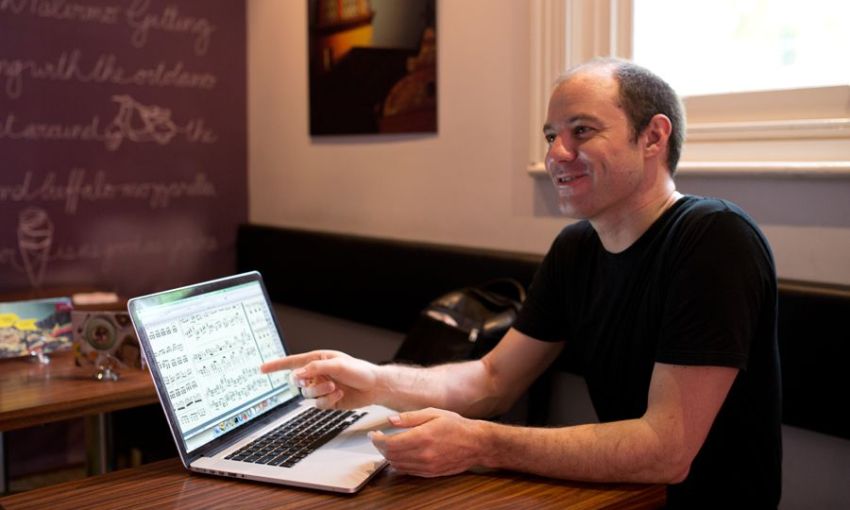At the end of 2013, Julian Cochran boarded a flight to New York. There, Gil Sullivan was preparing to play Julian’s compositions as part of a Carnegie Hall concert that also featured pieces by Mozart and Brahms.
How to be a contemporary classical composer
Performances of Julian’s work in New York (or St Petersburg, or Amsterdam) are not unusual occurrences for Australia’s foremost contemporary classical composer, who spoke with CityMag about carving out a place in history from his home in Adelaide.
Permanently bright and excited, Julian talked us through his career. After gaining a scholarship in piano studies to the Elder Conservatorium when only 14 years old, he decided to enrol in pure mathematics at university solely “to educate my mind”. Prior to this, and with only self-taught knowledge of computer programming, Julian had created a computer game and five hundred hand written letters [remember those? From before the internet] were mailed by fans from around the world. Julian then made writing world-class software for businesses in SA his livelihood. The business took off like a rocket, with most of the work [remarkably] conducted from cafés and restaurants around the city.
Undeterred by the fact he had already achieved in his early life what few of us will achieve in all the years given to us, Julian set about transitioning from composing in his spare time to becoming a full time composer – again without any formal training in the area. Here’s some advice we extracted from his avalanche of wisdom.
There are more important things than money
According to Julian there is “basically no industry” or marketplace for contemporary classical music, which makes it clear he is not in it for the money. Instead, he sees his work as part of a larger scale human conversation in which the music speaks.
“I made a really important decision that an album is fixed – it doesn’t change,” he says.
“I thought that written music lasts forever, it’s a blueprint that can be played over and over again. If Beethoven released his symphonies as albums they wouldn’t be popular now, because the underlying beauty and logic is carried through time far better with the written instructions.
“You’re creating something inspiring for the world that can be studied and performed. I think a lot of composers are conscious that they are creating something beautiful for the world, something beyond themselves.”
Even composers need Facebook
The Australian market for Julian’s music is particularly small, but he has found his audience and they have found him. With a Facebook following of more than 100,000, recognition in countries as far afield as Romania and an upcoming concert of Symphonic Tale for philharmonic orchestra planned in Poland’s Warsaw – Julian’s music sounds out clearly across vast distances.
“I think the music did it on its own,” he says. “People would share it on YouTube, they’d share it on Facebook and then you get 100,000 likes and thousands of people sharing it and so it expands. It’s not viral level, but it is a little bit exceptional.
“As a composer personally, I have enough of a following that I can make a living from pianists ordering the manuscripts just around the internet and then CD sales and licensing on top of that. I have my own online shop for the sheet music.
“I’ve had proposals from publishers but when I read their contract terms, because I’m also a business person, I realise I don’t need to sign up with them. Why do they want to take 90 per cent without furthering distribution? And why do they want half of the ballet rights and the other rights? I’m independent and it’s pretty good.”
Use the city
Despite finding an international audience, Julian is firm that he will maintain his home base in Adelaide. Having moved here as a child with his family, he has grown attached to the city as it allows him to be almost constantly productive.
“I have stayed for a while in New York and traveled extensively in Europe and Russia and I find that while superficially stimulated in the larger cities, you get a lot more done in Adelaide,” he says.
“For one, there’s greater efficiency and convenience here, so no wasted time. Secondly, there’s no distractions, which means that provided you have an inner focus the only thing left is significant achievements.
“Plus I like the coffee here.
“I live on North Terrace, don’t have a car… actually, I have a Lotus for fun but rarely drive it – and do everything in the city. I visit customers via taxi as I can have my take-away coffee and continue working in the taxi. I’m amazed that a lot of others don’t live and work in this way. When working intensely it is easier to be around people in cafés and restaurants and strolling, changing your view, instead of facing a wall.”
Always be better than you were before
Julian points out that the best test of quality is the passage of time: “When Mozart or any other great composer was writing there were also well-established composers who were popular, but they’ve been forgotten, history filters them”. Accordingly, each of his works are carefully crafted and painstakingly re-evaluated so that it might still be of worth centuries on.
“I’ll play and improvise,” Julian says. “I have hundreds of improvisations to choose from, so I can create music very quickly. But what I use as a composed work that I publish I am very, very, very selective about. If something is weak I will go back to it, go back to it, go back to it until it’s as strong as my other work.”




